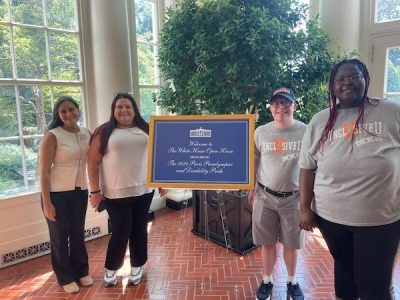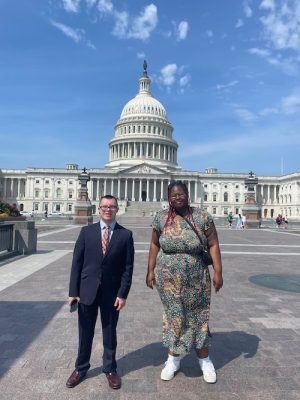
The White House. Capitol Hill in Washington, D.C. The New York State Capitol building in Albany.
These are just some of the places an enthusiastic delegation from Syracuse University’s InclusiveU program have traveled over the years, meeting with policymakers, politicians, and higher education leaders to push for change to make higher education more accessible for people with intellectual and developmental disabilities.
For more than a decade, InclusiveU, an initiative from the Taishoff Center for Inclusive Higher Education, has set the standard by which all other inclusive higher education programs are judged. Its model encompasses individualized and inclusive coursework, student-centered planning, internships, and social and extracurricular activities.
“I always wanted to go to college, and when I heard about Syracuse University and its InclusiveU program, I knew that was where I wanted to go to achieve my dreams,” says Matthew Falanga ’26, who was born with Down syndrome and is majoring in communications at Syracuse. “The best part of coming to Syracuse is making new friends and being involved on campus. It makes me feel very happy.”
Over the last 10 years, InclusiveU has experienced exponential growth and is now the largest program of its kind in the country. This year, 102 students are pursuing their academic dreams on campus, including 44 students who, like Falanga, live in residence halls.
Recruiting Advocates, Reducing Stigmas
Over the years, InclusiveU Director Brianna Shults G’20 has led countless trips to bring current InclusiveU students and recent graduates to meet with elected officials. These trips serve to recruit new advocates, increase support and awareness of the program, and reduce the stigmas that still exist surrounding students with intellectual and developmental disabilities.
The opportunities InclusiveU affords aren’t readily available for many students like Falanga. According to Think College, only 2% of school-age students with intellectual disability are likely to attend college after high school, and of the 472 colleges and universities in New York state, only 24 have inclusive postsecondary education programs.
“There was this cliff that many students with developmental and intellectual disabilities would drop off once they graduated high school. Some would find work or a program that filled time in their day, while some would do volunteer activities. Some just stayed home. By being able to take that next step in their development alongside their peers, continuing their educations while gaining skills to launch their careers, InclusiveU has given students the opportunity to define who they are and what they want to be. They get to have the same experiences their peers were afforded,” Shults says.
Now, thanks to a $200,000 grant from the B. Thomas Golisano Foundation, the School of Education’s Center on Disability and Inclusion will provide technical assistance to schools and colleges in Western and Central New York to create and enhance inclusive college programs for students with intellectual and developmental disabilities.
This is in addition to the technical assistance InclusiveU has already provided to colleges and universities in Arizona, Florida, Kansas, New York, Pennsylvania, and Tennessee when representatives from those institutions visited campus in 2023. InclusiveU students led campus tours while sharing how their higher education experiences had changed their lives.
“There are not enough inclusive programs like ours and our field is very collaborative. We want all students with intellectual or developmental disabilities who want to go to college to have an opportunity that fits their needs,” Shults says. “The demand versus available opportunity and the capacity of these programs is something that needs support. We are thankful for the Golisano Foundation’s help to build out this program and provide the type of support and knowledge that other programs [at other institutions] are looking for.”
Celebrating People With Disabilities
For many adolescent students with developmental disabilities, the pursuit of higher education is filled with roadblocks and can be a daunting task for both aspiring students and their families. But thanks to InclusiveU, students of all ages with intellectual and developmental disabilities are empowered to come to campus and experience college life in a fully inclusive setting, learning the necessary skills to thrive in the classroom, and find a job after graduation.
These experiences prove to be life-changing for students like Falanga, who over the summer interned with Disability Rights New Jersey, where he worked on a project promoting voting rights for people with disabilities, and also represented InclusiveU as an inclusive higher education advocate at a Disability Pride Event in the White House.
“We are thankful for the Golisano Foundation’s help to build out this program and provide the type of support and knowledge that other programs [at other institutions] are looking for.”
Brianna Shults G’20
It was a once-in-a-lifetime moment for Falanga, who had a specific message for the government officials he met during his visit.
“Just because I was born with a disability, I want to celebrate my disability. I also want to help other people with disabilities feel better about themselves. Be proud of who you are. It is important for people with disabilities to learn about these programs [like InclusiveU] and know that they can go to college and start their new life,” says Falanga, who hopes to use his degree to land a job where he can help create more legislation that opens doors for people with disabilities.
Opening Doors for All
Syracuse University has a proud 154-year history of opening its doors to all students who are interested in receiving a college degree, regardless of their background or upbringing.
InclusiveU, which was founded in 2001 as a dual enrollment program with the Syracuse City School District, has provided the necessary skills for students to both thrive in the classroom and find a job after graduation. By incorporating InclusiveU students in classes with the general Syracuse University student body, Shults says the entire campus community benefits.

“It helps make all Syracuse University students better friends, better classmates, better coworkers and better community members,” Shults says. “Having this experience and interaction with InclusiveU students helps our whole campus think inclusively. It helps our administration think differently and more inclusively. We’re able to adjust the way students access their classes or how they interact with faculty to make sure those experiences are inclusive for all.”
Equipped for Lifelong Success
The initiative’s work is evolving. InclusiveU students now participate in the University’s First Year Seminar course, and in May, InclusiveU is launching the first inclusive Syracuse Abroad experience to Italy, with a goal of expanding opportunities for its students to study abroad.
Once they earn Syracuse degrees, many InclusiveU students successfully find paid, competitive jobs, due in part to the strong relationships InclusiveU develops with its partners, both on campus and in the Central New York community. It’s also a result of the yearlong internships InclusiveU students participate in as part of their three years of academic education.
But there’s more work to be done when it comes to support and funding for InclusiveU, including thinking beyond the students’ time on campus.
“We want to ensure that students can lead the lives that they want to live afterwards, and that goes for employment, community involvement and living situations. We have advocated for ending subminimum wage and closing sheltered workshops. The Higher Education Opportunity Act hasn’t been reauthorized since 2008,” Shults says. “These are all really important things to help individuals with disabilities lead productive and meaningful lives beyond higher education.”
For now, Falanga is focusing on fine-tuning his public speaking skills, continuing to make new friends on campus and finding ways to get and stay involved with the University he loves so much.
“Syracuse University makes me feel very happy and proud. InclusiveU has helped me to make new friends, take great classes, and explore my career choices. This has changed my life,” Falanga says.
